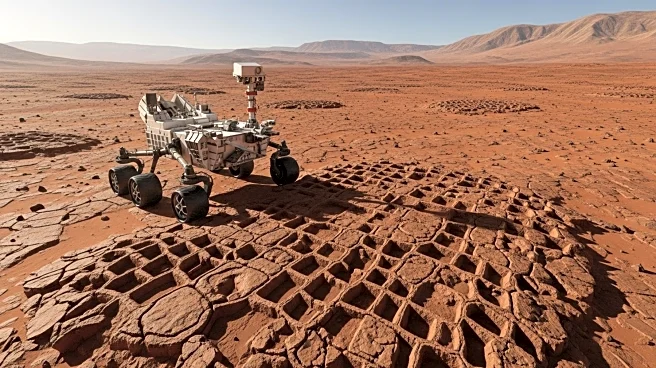What's Happening?
NASA's Curiosity Mars rover has been exploring the slopes of Mount Sharp within Gale Crater, focusing on a unique landscape known as 'boxwork terrain.' This area is characterized by ridges, hollows, and nodules that have intrigued scientists due to their potential to reveal Mars' watery past. The 'boxwork pattern' consists of low-lying ridges resembling a spiderweb shape, possibly formed by mineral-rich fluids that hardened certain areas more than others. Over time, erosion removed softer rock, leaving behind distinct ridges. Curiosity's mission, since its landing in August 2012, has been to study the Martian dirt layers to understand the planet's environmental history, including water presence and potential ancient life.
Why It's Important?
The investigation of the 'boxwork' pattern is crucial for understanding Mars' geological history and assessing its potential to have supported ancient life. By analyzing the texture, chemistry, and structure of these ridges, NASA scientists aim to reconstruct the environmental conditions of early Mars. This research could provide insights into the planet's ability to host life, contributing to broader astrobiological studies. The findings may also inform future missions and the search for life beyond Earth, impacting scientific theories about life's existence in the universe.
What's Next?
NASA scientists will continue to study the 'boxwork' terrain using Curiosity's advanced instruments to gather more data on the Martian surface. The rover's ongoing exploration will focus on identifying mineral compositions and erosion patterns to better understand the historical presence of water. These efforts are part of a larger mission to determine Mars' habitability and prepare for potential human exploration. Future missions may build on Curiosity's findings, using them to target specific areas for more detailed analysis.
Beyond the Headlines
The study of Mars' 'boxwork' terrain not only advances scientific knowledge but also raises questions about the ethical implications of space exploration. As researchers uncover more about Mars' past, discussions about planetary protection and the preservation of extraterrestrial environments become increasingly relevant. The potential discovery of ancient life forms could shift cultural perceptions of humanity's place in the universe, prompting philosophical and ethical considerations about life beyond Earth.











